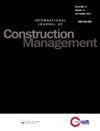印度隧道项目最重要风险因素选择:基于模糊的综合MCDM方法
IF 3.4
Q2 CONSTRUCTION & BUILDING TECHNOLOGY
International Journal of Construction Management
Pub Date : 2023-10-20
DOI:10.1080/15623599.2023.2267852
引用次数: 0
摘要
摘要本研究的目的是建立一种基于模糊的综合多准则决策(MCDM)方法,以生成印度隧道项目的风险因素排序。由于隧道工程的复杂性和高成本,我们有必要进行定量风险评估,以防止工程表现不佳。对大量风险因素的分析使任务变得困难。因此,本研究试图通过制定风险优先级的综合框架来解决这一挑战。在以往的工作中,关键风险因素(CRFs)是使用相对重要性指数从因子池中识别出来的。本研究采用层次分析法对CRFs进行识别。通过综合RII和AHP结果得到的25个关键因素列表,基于发生概率、影响和成本三个标准,使用模糊TOPSIS (Fuzzy TOPSIS)进一步分析了与理想解相似的顺序偏好模糊技术。在这项工作中制定的方法将有助于选择最重要的风险因素,从而大大改善印度隧道项目的风险分析过程。本研究有助于风险优先排序框架的发展,这将对研究人员和从业人员有用。关键词:多准则决策(MCDM)风险优先排序隧道工程模糊topsisahp印度隧道工程致谢感谢匿名审稿人对本文的认真审阅,他们的建议在很大程度上对本文的改进有所帮助。竞争利益作者没有相关的经济或非经济利益需要披露。作者贡献:snivedita Gogate和Abhaysinha Shelake对研究的概念和设计做出了贡献。Abhaysinha Shelake和Preetesh Band进行材料准备、数据收集和分析。手稿的初稿是由Nivedita Gogate撰写的,所有作者都对以前的手稿版本进行了评论。所有作者都阅读并批准了最终的手稿。符合伦理标准披露潜在利益冲突作者没有与本文内容相关的竞争利益需要声明。涉及人类和/或动物的研究不适用。知情同意不适用。伦理批准,同意参与并同意发表不适用数据和材料的可用性本研究过程中产生或分析的所有数据都包含在本文中。本文章由计算机程序翻译,如有差异,请以英文原文为准。
Selection of most significant risk factors for Indian tunnel projects: an integrated fuzzy-based MCDM approach
AbstractThe purpose of this study is to develop a comprehensive fuzzy-based multi-criteria decision-making (MCDM) methodology to generate ranking of risk factors on Indian tunnel projects. The complexities and high costs involved in tunnelling projects create a strong necessity to look into quantitative risk assessment so as to prevent project underperformance. The analysis of large number of risk factors makes the task difficult. Thus, the present study attempts to address this challenge by developing a comprehensive framework for risk prioritization. In the previous work, critical risk factors (CRFs) were identified using Relative importance Index from the factor pool. The present study utilizes the Analytic Hierarchy Process approach for the identification of CRFs. The list of 25 critical factors, obtained by integrating both RII and AHP results, is further analyzed using the Fuzzy Technique for Order Preference by Similarity to Ideal Solution (Fuzzy TOPSIS), based on three criteria, probability of occurrence, impact and cost. The methodology developed in this work will help in selecting the most significant risk factors, thus substantially improving the risk analysis process on Indian tunnel projects. This study contributes towards the development of framework for risk prioritization which will be useful for researchers and practitioners.Keywords: Multi-criteria-decision-making (MCDM)risk prioritizationtunnel projectsfuzzy TOPSISAHPIndian tunnel projects AcknowledgementThe authors thank the anonymous reviewers who carefully reviewed the paper and whose suggestions were useful in improving the manuscript to a great extent.Competing interestsThe authors have no relevant financial or non-financial interests to disclose.Author contributionsNivedita Gogate and Abhaysinha Shelake contributed to the study conception and design. Material preparation, data collection and analysis were performed by Abhaysinha Shelake and Preetesh Band. The first draft of the manuscript was written by Nivedita Gogate and all authors commented on previous versions of the manuscript. All authors read and approved the final manuscript.Compliance with Ethical standardsDisclosure of potential conflicts of interestThe authors have no competing interests to declare that are relevant to the content of this article.Research involving human participants and/or animalsNot applicable.Informed consentNot applicable.Ethical approval, consent to participate and consent to publishNot ApplicableAvailability of data and materialsAll data generated or analyzed during this study are included in this article.
求助全文
通过发布文献求助,成功后即可免费获取论文全文。
去求助
来源期刊

International Journal of Construction Management
MANAGEMENT-
CiteScore
8.60
自引率
17.90%
发文量
112
期刊介绍:
The International Journal of Construction Management publishes quality papers aiming to advance the knowledge of construction management. The Journal is devoted to the publication of original research including, but not limited to the following: Sustainable Construction (Green building; Carbon emission; Waste management; Energy saving) Construction life cycle management Construction informatics (Building information modelling; Information communication technology; Virtual design and construction) Smart construction (Robotics; Artificial intelligence; 3D printing) Big data for construction Legal issues in construction Public policies for construction Building and Infrastructures Health, safety and well-being in construction Risk management in construction Disaster management and resilience Construction procurement Construction management education
 求助内容:
求助内容: 应助结果提醒方式:
应助结果提醒方式:


